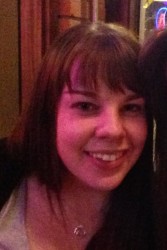
Annette Haas doesn’t have much personal experience with addiction. Her only addiction—and it’s a stretch—is to education.
“I’m a workaholic,” says Haas, a senior psychology and sociology major from Stockton, Ill. “I get too involved in too many things.”
This is not a diagnosis she’s made on her own. Thinking through her various commitments’ impact on friends and family members has given Haas a bit of insight into the people with whom she’s been working this fall. She holds an internship with Powell Chemical Dependency Center, an alcohol and substance abuse treatment clinic at Iowa Lutheran Hospital in Des Moines.
“At first I was observing treatment,” says Haas. “That involves sitting in on group sessions between a therapist and eight individuals who are all discussing their struggles with alcohol and drugs. Now I’m in charge of calling the Center’s graduates and surveying them about outcomes—whether they’ve stayed sober, whether they’re involved in other treatment groups, how they feel about themselves.”
The eye-opening experience that has taught Haas at least three lessons.
Lesson one: Although Haas’ addiction (if you can call it that) is benign compared to conditions like alcoholism and drug addiction, she’s not so different from the individuals who pursue treatment at Powell Center.
“It was a shock when I saw people who are not the bottom of the bottom, but the soccer mom and the lawyer,” says Haas. “It was eye opening for me to see stereotypes broken. These are really great people who happen to have problems that they’re struggling with.”
Lesson two: Health care practices aren’t as cut-and-dried as textbooks can make them out to be. There are all sorts of logistics that complicate treatment and recovery—insurance and affordability issues come into play, individuals struggle to remain sober, and caregivers fall into routine.
That’s why Steven Lancaster, assistant professor of psychology, says first-hand, applied experience is a must for students considering careers in human services or psychology.
“It is one thing to learn in a class about the challenges people face,” explains Lancaster. “It is a whole other experience to actually talk with the person about problems and possible solutions.”
Lesson three: Therapy is a very demanding line of work, so you’d better have the passion to carry through. The chemical dependency center is a second internship for Haas, who also works with Associate Professor of Psychology Maria Valdovinos. They study the impact of medication on behavior of group home residents with intellectual disabilities. Though she’s learned a lot, she’s learned that her deepest interest lies in grief therapy—that’s what she plans to pursue after graduation.
“The work takes a toll on therapists,” says Haas. “But they do it because this is something they have a passion for.”

